Poetic justice: black lives and the power of poetry | Books
[ad_1]
Performance poetry revolutionised me. When I was 13, my mother invited me to a group called Leeds Young Authors, which she co-ran with founder and poet Khadijah Ibrahiim. Together, along with visiting poets, they ran writing workshops for teenagers. The selling point was that I would get the chance to travel to the US to compete in a poetry slam festival, but the excitement of getting on an aeroplane was soon overshadowed by what I can only describe as enlightenment. Poems performed at the festival taught me about police brutality, gentrification and climate change before I even owned a computer. Performance poetry immersed me in a world of critical thinking, but also, a community of black poets. I shared stages, shook hands and was taught by some of the greatest black British and African American poets before the age of 20. From Sonia Sanchez to Saul Williams to Lemn Sissay and Jackie Kay.
Black British history and literature are intrinsically connected. Poems such as Linton Kwesi Johnson’s Five Nights of Bleeding explored the 1981 Brixton riots, while Benjamin Zephaniah’s The Death of Joy Gardner lamented on the killing of a Jamaican student who died in 1993 after being detained during a police immigration raid at her home. Literature was a forum for idea-sharing, community-building and support too. The Caribbean Artists Movement, founded by Barbadian poet Kamau Brathwaite, Trinidadian publisher John La Rose and Panamanian-Jamaican writer Andrew Salkey in London in 1966, set about promoting the work of marginalised Caribbean artists, writers and poets. More than 50 years later, black writers are yet to be fully absorbed into the mainstream. A 2018 study found that only 7% of work published in poetry journals were by people from BAME backgrounds. Black voices have often felt like guests in UK literature, despite being routinely summoned during political events. “No one leaves home unless / home is the mouth of a shark” – a line from Home by the British-Somali poet Warsan Shire – was a prominent slogan of the migrant crisis in 2015.
Lack of visibility is a decades-old conversation. Booker prize winner Bernardine Evaristo set up the the Brunel international African poetry prize in 2012 for emerging African poets, because she felt they were absent from contemporary literature. The African American poet Danez Smith, who won a Forward prize in 2018, saw the need for a seismic shift in the UK, tweeting that British publishers and readers needed to look to their homegrown young BAME talent, especially those who come from spoken word: “You don’t need to outsource it, they’re here.”
Black British poets, many of whom got their start through performing, have always been on the periphery. The consensus for a long time seemed to be that “good” poetry was published, “bad” poetry was performed. As Kwame Dawes writes in Wasafiri Vol 18: “The black British ‘performance poet’ who decides to produce for the page is faced with a massive challenge. Publishers suspect that the work will simply not stand up in print.” For those who do manage to get book deals, as the recent viral hashtag #whatpublishingpaidme shows, many are undervalued compared with their white peers. Change is long overdue and everything from bookstore shelves to prize shortlists to publishing boardrooms needs to reflect the actual DNA of the country. Recently, more than 100 black authors formed the Black Writers’ Guild. Addressing a letter to the “big five” publishers – Penguin Random House, Simon & Schuster, Hachette, HarperCollins and Macmillan – they called for transparency on “the submission-to-acquisition ratio of black authors” and requested “financial commitment to new awards recognising and amplifying black talent”.
The reforming of UK literature is an arts emergency. Roger Robinson’s success as the first black British poet to win the TS Eliot prize in 2020 is something that should be both applauded and interrogated. Earlier this month, I won an Eric Gregory award – a prize administered by the Society of Authors for a published or unpublished collection of poems by poets under 30. It’s a prize that not many black people have won, but I believe we are in the early days of a better future. Poetry is the language of urgency. It’s timely and timeless. Now more than ever, as the Black Lives Matter movement appears resolute on toppling racist and imperial structures, we need the words and radical ideas of black poets – to reimagine the kind of world we want to arise once the ash has settled.
Linton Kwesi Johnson: ‘Writing poetry for me was always a political act’
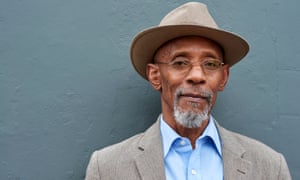
Linton Kwesi Johnson was born in Jamaica in 1952, and emigrated to Brixton, London, in 1963. His first poetry collection, Voices of the Living and the Dead, was published in 1974 by Race Today. Four years later, he released his debut album with Dennis Bovell, Dread Beat An’ Blood (he has released 12 dub poetry albums, and five compilations). Johnson is the only black British poet to be published by Penguin Modern Classics. His first poem in a decade, Goodnite, is published in the spring 2020 issue of Prairie Schooner – a University of Nebraska literary quarterly.
How did you start out in poetry?
I started after discovering black literature, which stirred something in me. Writing poetry for me was always a political act. Poetry was a cultural weapon.
Who is your audience?
I have two sets. I’ve sold 4m records, so the vast majority are consumers of reggae. The whole object of making albums for me was to get my poetry out to people, which worked. The other set is the people who come to the readings I do up and down the country. That’s smaller.
Name a poem you wish you had written.
Poem of Shape and Motion #1 by the Guyanese poet Martin Carter, one of my favourite ever poets. [It begins: “I was wondering if I could shape this passion / Just as I wanted in solid fire.”] It’s beautiful, profound and elegiac in tone.
Why do we turn to poetry in challenging times?
[Jamaica’s poet laureate] Lorna Goodison was on to something when she said there is a medicinal quality to poetry. It can be soothing, therapeutic or even just distracting if you have a troubled mind. It serves a purpose, like the Bible did in my mother’s generation. They turned to the book for solace. Poetry has the same quality.
What kinds of challenges have you faced as a black poet in the UK publishing industry?
I’ve never been part of the publishing industry. I’ve always been on the periphery. Even when I was younger, I was just known for touring with John Cooper Clarke. John was the punk poet, I was the reggae poet. Things might be changing now, though, with Jay Bernard and Raymond Antrobus in print, and Roger Robinson winning the TS Eliot prize. I hope so.
Are you inspired by the Black Lives Matter protests around the world?
I’m over the moon about what’s happening with young people. I come from a rebel generation of activists who wanted to change the country, and it feels like this new generation are going in again. I’m so glad I’m alive to see it happening. It doesn’t matter if the current protests were inspired by America. There’s been a huge response here because there is racism in the legal system, and a culture of impunity in the police. I’d go so far as to say that racism is part of the cultural DNA of Britain.
Have you joined in yourself?
No. They don’t want some old fuddy-duddy turning up. I hope we inspire them to blaze the trail: they all have access to the work we’ve done about our struggles at the George Padmore Institute [an archive about the black community of Caribbean, African and Asian descent in Britain and continental Europe]. This is their time.
What’s your favourite protest or political poem?
There It Is, by Jayne Cortez, the great American jazz poet. It’s a very incendiary poem, a rueful indictment of the American elite and all that is rotten about the US. It’s combative in tone, and revels in its language.
Which poet most makes you laugh and why?
John Hegley. I love his short, witty pieces. They’re often anecdotal, about the absurdities of everyday life, like parodies of poets doing poetry.
Quote a line from a poem of yours that you think best reflects our times.
One line couldn’t do it, but my poem Liesense Fi Kill comes to mind, which I recorded on my More Time album [released in 1999]. It speaks about black deaths in police custody. Most of what I’ve written over the years is about racial equality and social justice. It’s all still relevant today.
Who are the poets you turn to?
Kamau Brathwaite, one of the giants of Caribbean poetry, Derek Walcott and John La Rose, especially his Eyelets of Truth Within Me collection. TS Eliot, as well.
Can poetry change the world?
No. Poetry can’t change anything. It can have agency in terms of raising people’s consciousness. What it can do is raise awareness.
Interview by Jude Rogers
Linton Kwesi Johnson’s Selected Poems is published by Penguin
Vanessa Kisuule: ‘The toppling of the Colston statue is the most pivotal moment in this city I’ll see in my lifetime’
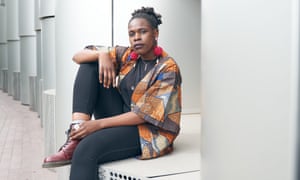
Vanessa Kisuule, 29, grew up in Kent and has lived for the past 11 years in Bristol, where she is the current Bristol City Poet. A veteran of the UK’s spoken word scene, she has won more than 10 slam poetry titles, including the prestigious Roundhouse Slam for 2014. She is the author of two collections, Joyriding the Storm and A Recipe for Sorcery, both published by Burning Eye Books, and her work was highly commended in the Forward prize anthology 2019.
How did you start out in poetry?
I always liked writing, but I was quite late to an appreciation of poetry. When I was 18 or 19, I went to Uganda, where my family are from, and I ended up hanging out with a cousin who was really into performance poetry. I thought it sounded pretentious, but then he showed me some stuff on YouTube and I just thought, that’s so brilliant, that really speaks to me. It felt illuminating that poetry could be colloquial and dynamic and engaging. Back home, I made my first foray into performing at the Poetry Cafe in Covent Garden.
You’ve published two books, but do you still feel more at home on the stage?
Yeah, probably, and that’s a gap I’d like to bridge. But it’s where I started and it’s where I feel my words best represent themselves – they feel a little bit naked and defenceless on the page without me to advocate for them.
What kinds of challenges have you faced as a black poet in the UK publishing industry?
I’ll be honest with you. I know the challenges are there, and that they’re profound, but for me personally, I never really thought about publishing in that traditional way, because I was coming up in the slam world, which arguably grew from a community of writers that felt a little bit uninspired or maligned by the traditional publishing world. That route wasn’t something I was aiming for, so I never had to come up against the prejudices that lie within it.
What prompted you to write [in the poem Hollow] about the toppling of the Edward Colston statue in Bristol?
It’s probably the most pivotal moment in this city that I’m ever going to see in my lifetime, and as the City Poet it felt right to respond to that. The way in which that statue came down felt so unequivocally correct. Statues have come down since then with a crane and by official council appointment, but in Bristol we don’t roll like that, we just pulled the fucker down and chucked it in the river. I loved that. It felt divine.
Have you been inspired to write about the current Black Lives Matter protests in any other way?
I think I’m of much better use speaking to our joy, our mundaneness, all the things that people don’t afford us. The establishment is obsessed with [black people’s] trauma. Those are the stories that they keep commissioning from us, the stories that get the Oscars and the Baftas. They have fetishised our pain to the point where, as an artist, you start to realise: “Oh, I only really stand to make money or build stature off the literal blood and pain of not just my ancestors but the people living now.” And that’s a very uncomfortable equation. Obviously we have to speak to our reality, to the struggle, but not for the titillation of white liberals.
Who are the poets you turn to again and again?
Danez Smith is someone who continues to blow my mind, and there’s always something new to see in their work. Also: Patricia Smith, Caroline Bird, Lisel Mueller, Tony Hoagland.
Quote a line from a poem of yours that you think best reflects our times.
I wrote a poem during quarantine for someone whose kid was fed up with being inside, and one of the lines was: “I brought you into a world I do not know, all I could do was discover it with you.” I’m quite obsessed with parenthood even though the idea of it terrifies and slightly repulses me – the idea of being solely responsible for another human being. I’m very interested in this idea of being a child’s moral compass, the person they go to to try and understand how the world works, which assumes that you know how the world works. How on earth do you assure a kid that everything’s OK when you don’t know everything’s OK, or you’re pretty sure that things aren’t?
Can poetry change the world?
I don’t know, is the obvious answer, I don’t have a bloody clue.
Interview by Killian Fox
vanessakisuule.com
Raymond Antrobus: ‘In the classroom, I see how a poem can change a person’s life’

Raymond Antrobus was born in Hackney in 1986 to an English mother and Jamaican father. He started performing poetry at 19, and his early poems were collected in To Sweeten Bitter, published by Out-Spoken Press in 2017. In 2019, he won the Ted Hughes award, and became the first poet to win the Rathbones Folio prize for his 2019 collection, The Perseverance.
How did you start out in poetry?
My father was a Jamaican Rastafarian who would record poems off radio and TV. I’ve fond memories of sitting on his lap, listening to Gil Scott-Heron doing Whitey on the Moon, or Colonization in Reverse by Miss Lou [Louise Bennett], him in hysterics. It was catharsis. After I started performing poetry, Jacob Sam-La Rose invited me to watch him teach poetry, Malika Booker mentored me, then I did workshops with Roger Robinson, Nick Makoha, Jay Bernard, so many others. I was nurtured by that community, and later, by the Cave Canem Foundation [for Black poets] in the US. Poetry is a vine, not a vacuum.
What kinds of challenges have you faced in the UK publishing industry?
It was clear to me early on that there are no black editors at any of the larger publishers which have poetry lists. My books were rejected from those major presses, and read in a reductive, isolated way. I kept being told my books were about identity, then I’d read books by white poets, and think, how are these not about identity? I was being told theirs were about nature and philosophy, but mine were also about those things. I wasn’t allowed that complexity, just given this unimaginative pathology. I’m proud to be part of the Black Writers’ Guild, who are addressing how this racism is systemic in many ways.
Is there a poem you wish you’d written?
I’d rather think of poems in the company they keep with each other, but if I had to choose, a poem by the 13th-century Persian Sufi poet, Hafez. It begins: “Even/After/All this time/The sun never says to the Earth/ ‘You owe me.’” He wrote in his everyday vernacular, but his words transcended. It makes me think of black British poets writing now, thinking of how we too can transcend this moment.
Who is your audience?
I honestly don’t think about audience when I’m writing, but I wanted to get The Perseverance into deaf schools [Antrobus was diagnosed with deafness at six], working-class schools, Hackney schools. I wanted to model what survival looked like for the kid I once was.
Are you inspired by the Black Lives Matter protests around the world?
Yes. I was raised by a mum who took her kids to Trafalgar Square to march for Mandela, and a dad who talked about Marcus Garvey and the freedom movement. It’s made me realise how misaligned some of us have been. It feels like a lot of people are in Year 7 of that education. I hope we can all make it through this anti-racism university.
Why do we turn to poetry in challenging times?
Because a poem’s about a moment: this moment. Everything else is cut away. It can give affirmation and clarity. It’s why we read poems at weddings and funerals. It can also help people embrace how complicated life is, with no conclusion or resolution.
Who are the poets you turn to?
I’ve been looking to poets coming up behind me, like Gboyega Odubanjo and Belinda Zhawi, and poets ahead of me, like James Berry, who was the first black poet to anthologise black British voices. I also love William Blake, and how he wrote about class, and the literary landscape he created in London. When he mentions places like Peckham Rye, Westminster Bridge, Nunhead cemetery, it makes me think how growing up in Hackney was about postcodes, and where your square metre was.
Quote a line from a poem of yours that you think best reflects our times.
Taking one line from a poem is a bit like taking a brick from a wall. I’d rather see people lean into poetry collections, to see a book like a door. Two of my poems, Miami Airport and Two Guns in the Sky for Daniel Harris, have been read, filmed and uploaded recently by people in America as part of the protests. That was quite profound, knowing that these poems now exist without me, and are part of a dialogue.
Can poetry change the world?
I don’t separate myself as a poet from being an educator, and in the classroom, I can see how a poem can change a person’s life. To see a quiet student read one and own that space: poetry is about that ripple effect, that breakthrough.
Interview by Jude Rogers
raymondantrobus.com
Grace Nichols: ‘I love the process of going through my old work and making sudden discoveries’
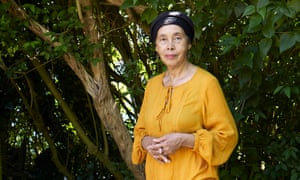
Grace Nichols was born in Guyana in 1950 and has lived in Britain since 1977. She has published nine collections of poetry for adults as well as several poetry books for younger readers. Her awards include a Cholmondeley award and the Guyana poetry prize. Her new book, Passport to Here and There, was published this year. She lives in Sussex with her husband, the poet John Agard, and family.
Quote a line from a poem of yours that best reflects our times.
“For the simple harbour of a hug.” That’s the last line in a poem, Harbour, I wrote a few weeks ago for the poetry website Write Where We Are Now initiated by Carol Ann Duffy, whereby poets can respond to the current pandemic. Even though the virtual world can console, I’ll trade it for this simple harbour.
Which poets make you laugh?
I don’t think I’m biased but in all honesty the poet John Agard, whose poetry is often imbued with a subversive humorous spin.
How does it feel to be included on the GCSE syllabus?
I was pleased to have two of my poems studied by GCSE students after having studied many English poets such as Shakespeare, Keats and Wordsworth when I was at school in Guyana. I think this introduces teenagers here to a diversity of modern voices such as Gillian Clarke, Imtiaz Dharker, Carol Ann Duffy, Daljit Nagra, John Agard, Simon Armitage. Through performances organised by GSCE Poetry Live, they get to hear in person the very poets they’re studying.
Tell us about your writing about the English landscape.
A sense of place is very important to me. In my latest book I have poems such as Black Woman Blackberrying. I took a long time to adjust from Guyana. Now I like the different seasons – especially spring, a season filled with hope.
What is your typical writing day?
I write at my old wooden table, where I also keep poems in progress and bills to be paid. I think my muse enjoys a bit of clutter. I love the process of going through my old work and making sudden discoveries. If I’m not having a fruitful day, I’ll simply read one of my favourite poets or put on some music or go shopping.
Did you face any challenges from the UK publishing industry?
When I approached Oxford University Press back in the early 80s with my first collection of poems, I Is a Long-Memoried Woman, they felt that Edward Kamau Brathwaite had already covered that territory, even though my book was from a female perspective, the journey of an African woman captured in slavery and taken to the Caribbean. It was brought out by Karnak House, a small Caribbean publisher, but after it won the 1983 Commonwealth Poetry prize I was approached by Virago, who went on to publish four other collections. Now I’m published by Bloodaxe Books. The road to getting published is a hard one for most young poets, more so for black poets.
Why do we turn to poetry in challenging times?
The rhythm and musicality of poetry is more direct in its appeal to the human heart and spirit.
Are you inspired by the Black Lives Matter protests?
I found it heartening to see how black young people have been supported by their white friends in the movement. I agree with David Olusoga that black history must be taught in schools. Many don’t realise why black and brown people are in England and how Britain has benefited economically from slavery and colonialism. People need to be educated about that for healing to take place.
Recently, there have been conversations about racism in literature, from prizes to disparity in advances. What changes would you like to see?
The power to publish, review, award prizes has always been overwhelmingly in the hands of white British selectors. When books by black poets do get reviewed, it’s not unusual for reviewers to group them together as performance poets as opposed to literary poets. Such a polarity is divisive and puts the black poet in a box, as if their work might be entertaining on stage but not of lasting literary value. All labels finally reduce the complex layers of the imagination.
Which poets do you turn to?
Elizabeth Jennings for wisdom and humanity. Pushkin. I love Lorca. Derek Walcott. The Guyanese poet Mahadai Das whose work has a sad beauty and whose life was tragically cut short.
Name a poem you wish you had written.
One Art by Elizabeth Bishop, that poem about losing things. I can so identify with it.
What is your favourite protest or political poem?
A poem by the Guyanese poet Martin Carter, our national poet, called Looking at Your Hands, which ends with the resonant line: “I do not sleep to dream, but dream to change the world.”
Can poetry change the world?
People can be nourished and inspired by poems and have a heightened awareness of wonder. It’s not going to change the economic system, but it can enrich, comfort and provide ammunition to go on living.
Interview by Anita Sethi
Grace Nichols’s new book, Passport to Here and There, is published by Bloodaxe
Kayo Chingonyi: ‘There’s something re-energising about connecting to feeling, even if that feeling is pain’
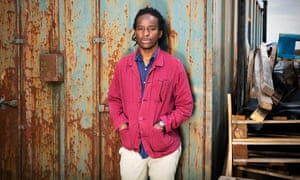
Kayo Chingonyi was born in Zambia in 1987 and moved to the UK aged six, growing up in south-west London. His debut collection, Kumukanda, won the 2018 international Dylan Thomas prize and a Somerset Maugham award. Chingonyi is poetry editor for The White Review and an assistant professor at Durham University. His next poetry collection, A Blood Condition (published by Chatto & Windus) is forthcoming, as is his memoir, Prodigal (Picador). He lives in West Yorkshire.
What are the biggest challenges faced by black poets in the UK publishing industry?
One is to do with a process of tokenisation, whereby one poet is taken to be reflective of a kind of monolithic black experience, when there are as many black experiences as there are kinds of people. Not many black British poets have been celebrated by the bigger publishers – black American poets are often met with a warmer reception. There hasn’t been a proper reflection in publishing of the rich tradition that I draw on as a black poet in the UK. I’m very happy that, for example, Roger Robinson is getting his flowers now, but I think it’s long overdue, and as a consequence the coverage of black poets feels ahistorical sometimes.
Has editing poetry at the White Review given you an insight into how progress might be made?
We sometimes fall into this notion that there isn’t a range of poetry to choose from in the UK, but there really is. More needs to be done in terms of diversifying the pool of editors, but also in extending the range and remit of the process of editorship. Every editor’s perspective on what is good is subjective, but a great editor looks beyond that: they take their time with work that’s unfamiliar and learn to appreciate it on its own terms. If existing editors do that, and if new editors are allowed to enter the fold, then I think British poetry publishing will be much better for it.
How did you start out in poetry?
I’ve always been fascinated by language. It started with my mum teaching me English in Zambia by labelling all the different things in the house with the English name – I guess that gave me a playful relationship to the language. There’s a sense in which writing poetry is just that tendency to play with language taken to an extreme, and that tendency has been with me since the start. I don’t think I ever didn’t write poetry, in that sense.
Have you felt compelled to write anything about our current chaotic times?
In terms of the current politics of race, I’ve been writing about that already, so I don’t feel a need to create new work as such. I’m very sceptical of the poems I write as a knee-jerk response to a particular situation, and so I have to take some time and resist the urge to react immediately. I have to do some deep thinking, some soul searching, I have to commune with other human beings, and then after that process I might write something. But in response to current moments I’ve been mostly reading, watching documentary films, trying to learn as much as I can.
Do you have a favourite protest poem?
I really like a poem called Kerosene, by Tim Seibles, written in response to the uprisings that followed the unlawful beating of Rodney King by police officers in Los Angeles in 1992. There is in that poem a sense of the breadth and depth of the pain that was felt in that community, and I think such embodied feeling is important to hold on to, because it can get lost sometimes in the compulsion to historicise. Also, as these atrocities accumulate, there’s a kind of fatigue that sets in and you can lose faith, and I think there’s something re-energising about connecting to feeling, even if that feeling is pain, because it creates nuance, and creating nuance is encouraging to empathy.
Which poets do you turn to again and again?
When I’ve been doing a lot of editing, or judging a poetry prize, or when I’m low in capacity, I often read a poet called Michael Donaghy, whose poem Black Ice and Rain I really love. And I love to read my contemporaries, in Poetry London or Granta or zines like Zarf, and be blown away by what people are doing.
Name a poem that you wish you had written.
The Same City, by Terrance Hayes, I think is an almost perfect poem.
Can poetry change the world?
If we recognise the magical capability in poetry, the power that words in a certain pattern have to affect reality, to alter the mind state, then, yes, it changes the world all the time. There has been no substantive change in any society without that complementary process of magical thinking.
Interview by Killian Fox
kayochingonyi.com
Malika Booker: ‘I write for that bullied little girl in the playground who didn’t see herself reflected’
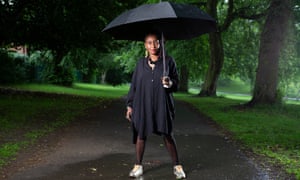
Malika Booker’s poetry collections include Pepper Seed and Breadfruit, and she is featured in Penguin Modern Poets 3. She is winner of the Cholmondeley award, founder of writers’ collective Malika’s Poetry Kitchen, and was shortlisted for the 2020 Forward prize for best single poem. She was born in London to Guyanese and Grenadian parents, grew up in Guyana and currently lives in Leeds.
How did you start out in poetry?
I came from the Caribbean age 11 and went to school in south London. I was bullied. School was an awful time. I escaped through reading. I’d convinced the librarian that she needed someone to stack the shelves. School developed my love of William Blake and the language of the Bible. I got involved in drama and a teacher gave me a diary and I’d write plays. Being an outsider enables you to see more. Books have always been my friend, saviour, way to travel, to see myself. I wanted to give voice to experiences I wasn’t seeing reflected, to redress narratives.
Who is your audience?
I write for that bullied little girl in the playground who didn’t see herself reflected. Literature’s a tapestry which has been a white cotton cloth bleached of other narratives. I’m writing to be a part of that tapestry.
Quote a line from a poem of yours that best reflects our times.
“Oh Lord, there is pepper in the deads’ mouths and coffins fly overhead”– from a poem called Island Grief after Hurricane Ivan, which devastated Grenada. I felt people had no language for this devastation and were in shock. With Covid-19 and the death of George Floyd, the mounting tragedy of death is forcing people to watch and not dismiss systemic racism.
What kinds of challenges have you faced as a black poet in the UK publishing industry?
When I first started, it was a closed shop. That’s why Roger Robinson and I started Malika’s Poetry Kitchen 20 years ago for black and working-class writers who weren’t getting the space. As a marginalised community, it’s about supporting each other to develop craft and be raw and vulnerable. Bernardine Evaristo set up Complete Works [a mentoring scheme for poets of colour] and changed the poetry landscape – an influx of poets came through it. British poetry is about subtlety and here I am writing emotionally charged poems. Publishers need to open up their ideas about the poetic.
What is your favourite protest or political poem?
A poem by the Latin American poet Martin Espada, Alabanza: In Praise of Local 100, about 43 people [members of Hotel Employees and Restaurant Employees Local 100, working at the Windows on the World restaurant] who lost their lives in the World Trade Center attack. It’s for the ordinary, the unspoken for, the undocumented. This poet writes about civil unrest, systemic injustice, the struggles of immigrant tenants. He showed me how to write poetry of protest and witness.
What is your typical writing day?
I try and get to my desk at six and work till 12. I’m working on a poetry collection looking at death and Caribbean traditions. A lot of times we’re not given space to grieve. I’m also working on a performance piece and PhD. I set timers. When I form a habit, the writing flows.
Why do we turn to poetry in challenging times?
The poet is attempting to articulate what cannot be said; that imagistic language seems to hold painful emotions and find the essence of them.
Are you inspired by the Black Lives Matter protests around the world? Have you joined in?
I haven’t joined in as I’ve been isolating. I’m so moved and impressed by them and I feel like I’m in the middle of a seismic shift and worldwide revolution.
Recently, there have been conversations about racism in literature, from prizes to disparity in advances. What changes would you like to see?
The publishing industry needs to have more black representation at all levels. There needs to be data – how are writers reviewed? There’s a diversity of voices even within the black community – but publishers want another Zadie Smith. From acquisitions to newspaper reviews, there need to be hard questions asked.
The poets you turn to?
Sharon Olds, I love her work. Toi Derricotte, Yehuda Amichai, Patricia Smith. I want to big up Jay Bernard for Surge, a profoundly important book, and Roger Robinson’sA Portable Paradise totally resonates.
Name a poem you wish you had written.
The Domestic Science of Sunday Dinner, by Lorna Goodison, the Jamaican poet laureate – it’s brilliant.
Can poetry change the world?
Yes. Poetry sales have been rising as the world has become more complicated with Brexit and the Trump administration. Poets interrogate the world to arrive at truth and honesty and that can inspire people.
Interview by Anita Sethi
Malika Booker is curator and host of the Peepal Tree Press podcast New Caribbean Voices